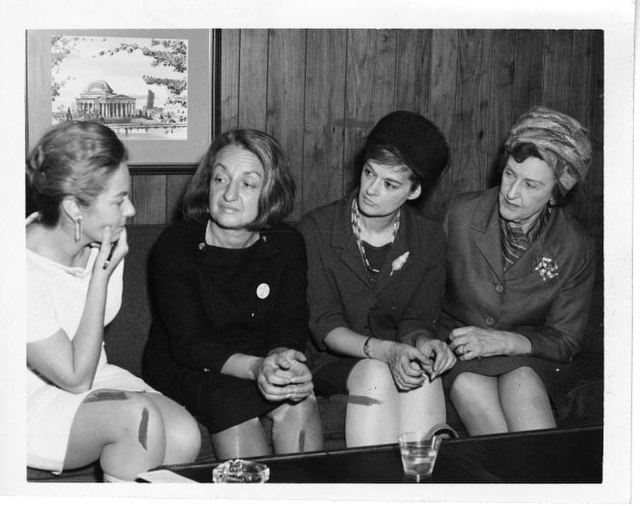“Born Bettye Naomi Goldstein on February 4, 1921, in Peoria, Illinois, both of her parents were immigrants. Her Russian father Harry worked as a jeweler, and her Hungarian mother Miriam was a journalist who gave up the profession to start a family.”
This passage, from a Smithsonian magazine 2021 biographical essay about Betty Friedan, has stuck with me. Which is a bit random because it has nothing to do with my reason for being there in the first place. I was reading up on the author of the 1963 feminist classic The Feminine Mystique, for reasons entirely unrelated to The Canadian Jewish News, and could not get over this essay not mentioning that Friedan was Jewish. Imagine explaining, in detail, the whiteness of Friedan’s feminism, but also how it emerged from her understandings of the civil rights movement, and just generally focusing on the intersectionality of it all, and, again, not mentioning that she was a Jewish lady.
I am not mad at the Smithsonian intern whose byline is on the piece, nor at the higher-ups who presumably read and vetted this otherwise well-presented treatment. This isn’t even a call-out, but merely an observation. I am interested in what it says that this isn’t even odd. I have seen things like this a million times, over the years, without remarking on them.
I was sitting there, reading about Friedan being half “Russian” and half “Hungarian” and looking at the portraits of her and remembering once hearing US senator Bernie Sanders refer to his heritage as “Polish” and reading some viral post about now the actress Amy Schumer doesn’t look Middle Eastern and somehow, amidst all of this, something clicked.
Why are we hearing so much these days (including from a flyer up in the Kensington Market) about how the Israeli-Palestinian conflict is between white people and racialized ones? This is not just about idiots who use TikTok as a history education, who have never heard of Yemenite or Ethiopian Jews, or even of Nazis’ racial antisemitism impacting yes even (and numerically, primarily!) Jews who would not be considered racialized in 21st century North America. It is also about the years and years and years of North Americans—Jews included—viewing it as vaguely antisemitic to suggest that Jews were in any sense a people or an ethnicity (forget a race).
Yes, people will say, and will be correct in saying, that Jews come in all races and that you can convert into Judaism, but we all know this was never really about that.
Erasing Jewishness as an ethnic category was about being able to speak of Jews as part of that mass of immigrants from European countries, who were amorphously from Europe, therefore European, therefore white. It didn’t matter that no one in Poland thought Bernie Sanders’s ancestors were Polish, nor did they think this of themselves, and same deal for Betty Friedan’s.
I say this with the confidence I do not because I am a Sanders or Friedan expert but because I have the same general ancestry as they do and this is a history I’m familiar with. To say that Friedan was of something beyond Russian-Hungarian background, per this way of seeing things, would not be to honour the truth about her heritage, but rather to somehow adhere to European antisemitism. To stick it to the antisemites, you had to say that they were just as Russian or Hungarian as anyone else. This gets repeated enough times and people (in North America, at least) start believing it.
We’re left, then, with a kind of quasi-self-inflicted erasure. Jews today see flyers about Israel-Palestine as white-vs-brown, or DEI events addressing every marginalized group but our own, and our hands are tied. We know we’re Jews, that this is a thing, but we’ve trained ourselves out of saying it, before any radicalised Gen Z-er even had a chance to get it wrong.
For more original Jewish culture commentary from Phoebe Maltz Bovy subscribe to the free Bonjour Chai newsletter on Substack.
The CJN’s senior editor Phoebe Maltz Bovy can be reached at [email protected], not to mention @phoebebovy on Bluesky, and @bovymaltz on the website formerly known as Twitter. She also holds forth on The CJN’s weekly podcast Bonjour Chai.
